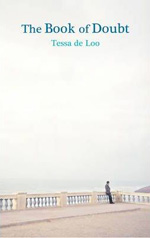

Haus, paperback, 9781906598945
The Book of Doubt tells the story of a young Dutch man's search for his father, a Moroccan musician his mother had a brief relationship with. Accompanied by his best friend Hassan, the man, Saeed, takes a road trip around Morocco, following a trail of rumour about his father's whereabouts. With each stop, Saeed learns more about his father, and the revelations push him away from his old life and into the arms of religious extremism.
Saeed and Hassan's road trip is sandwiched between two episodes in Saeed's Amsterdam life. The first exposes his doubts about the life he and his mother lead and the beliefs that fuel it, the second finds his old doubts replaced by dangerous new certainties. Between these events, Saeed's transformation is deftly mapped out, as each stop on his Moroccan road trip brings him further from his old ways of thinking. Discoveries about his father's life, particularly his womanising and serial abandonment of his families, erode Saeed's idolatry. The discovery that one of his father's affairs cost him his finger, and therefore his ability to play his instrument, causes Saeed to replace the search for identity through his father with a new search, one which draws him closer to a fundamental and radical form of Islam. A new Saeed emerges, one that is neither a product of his father's dissolute ways, nor of his mother's constant search for a new spirituality. It is the need for certainties where there used to be doubt that have shaped him. When he returns to Amsterdam at the end of the book, it is this Saeed who struggles to face the realities of modern Dutch life.
The Book of Doubt is an ambitious novel; de Loo introduces a profusion of apparently unrelated narrative threads, including revelations about Hassan's sexuality, Saeed's painfully platonic relationship with Hassan's sister, a sub-plot about a Chechen terror group, the trials of Saeed's job as a taxi driver, and a childish world called Saeedi-Hassaniah the friends invented as youths, among others. All of these narrative parts are woven together in a shocking denouement that just about succeeds in bringing them together, though not without the occasional stretch of credulity. The sprawling narrative also means that the book frequently loses focus, and it sometimes requires a little perseverance on the part of the reader to get back on track. Saeed's search for identity takes a few twists and turns before it eventually settles on being an examination of what drives young men towards extremism. It's a long ride, and de Loo does not always take you along with her on it.
Having said all of that, there is something enjoyable about this book. The dour Saeed and
vivacious Hassan make good foils for one another, and their road trip through Morocco is enjoyable
to tag along on. The revelations about Saeed's father and the effects they have on him are
beautifully paced, and there is a sense of satisfaction as the narrative starts to gain direction.
Even a slightly clunky translation doesn't distract too much from de Loo's fluid prose. It is a
book in which she attempts too much, perhaps, but she succeeds with much of it, and deserves
praise for a bold attempt at tackling some difficult ideas.
